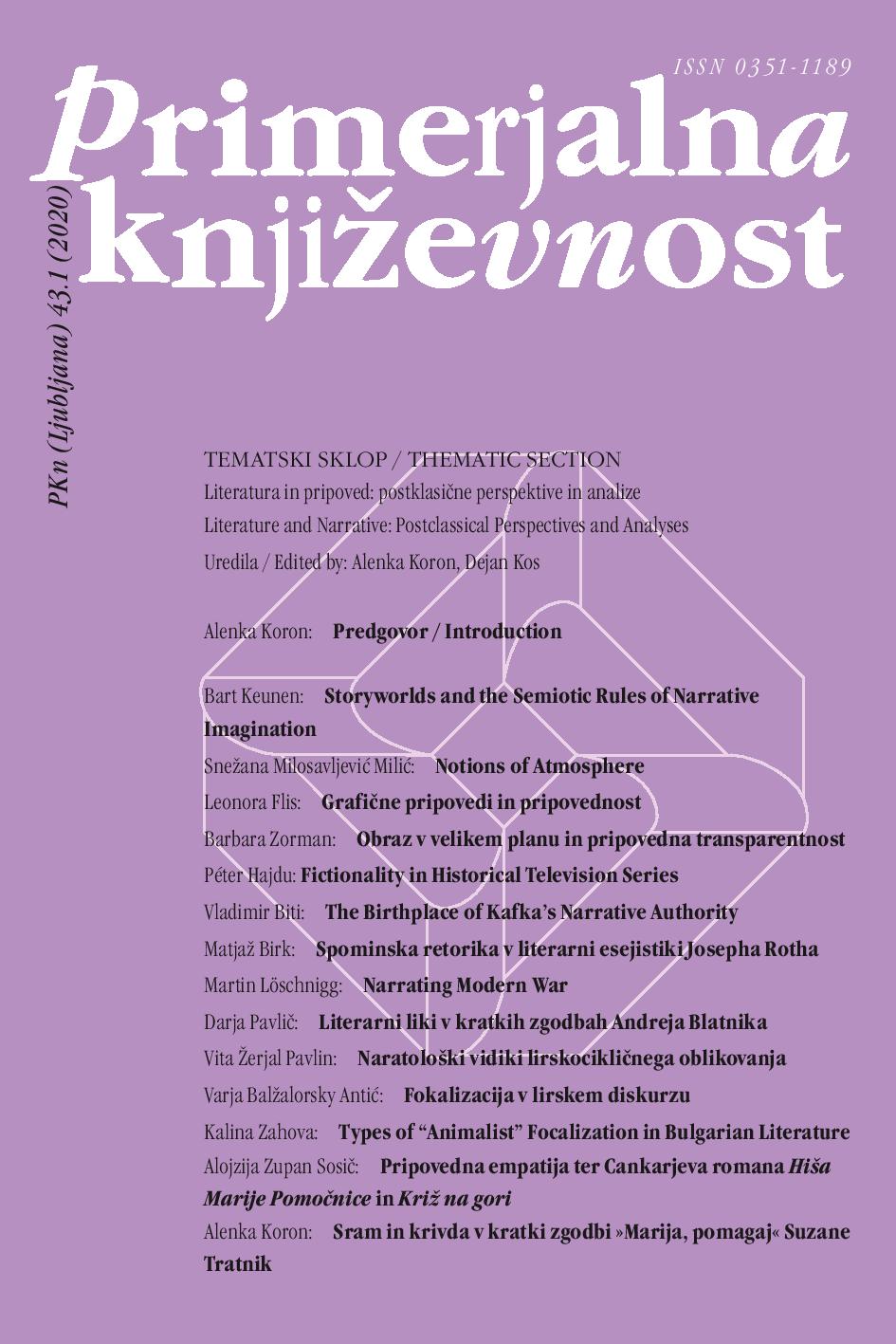The Rhetoric of Memory in the Literary Essayism of Joseph Roth
DOI:
https://doi.org/10.3986/pkn.v43.i1.07Keywords:
Austrian literature, Roth, Joseph: The Wandering Jews, literary essayism, Eastern Europe, Jewry, Judaism, collective memory, collective identity, ideational and cultural polyphonyAbstract
The present discussion focuses on Juden auf Wanderschaft (1927), the central literary-essayistic work with a Jewish theme by the Jewish-Austrian writer and journalist Joseph Roth (1894–1939). Based on the theory of rhetoric of memory (A. Erll), it sheds light on narrative strategies and the correlation between the narrativization of collective memory and the literary representation of identities and cultural practices of Eastern European Jewry. Anchored in the flexible point between Western European and Eastern Jewish cultures, the author legitimizes cultural practices of Eastern European Jewry embeded between the spiritual and the sensory by connecting, in functional harmony with the monumental, the antagonistic and the experiential modes of the rhetoric of memory. In the prism of critical deconstruction of Western European ideological discourses, the discussion simultaneously reveals Jewish cultural self-deceptions, and, interweaving the antagonistic and the reflexive modes, sensitizes the reader for the perception of “the other status” and for the constructional character of culture. The shift of the barycenter of the rhetoric of memory from the contrastive to that of correspondence models humanity in the trans-ethnic dimension, and exposes it as an ideational postulate for the attitude towards Eastern Jewry as a complementary foreignness (O. Schäffter). Despite cultural binarities as a product of antagonistic rhetoric of memory and irrespective of the historical pessimism relating to the fate of Jews, hybrid identity constructions offer the reader convincing signals for disclosing transdifferences and possibilities of ideational polyphony in intercultural communication.
References
Baric, Daniel. »Joseph Roth et l’art du reportage à l’époque de la Nouvelle Objectivité«. Communications 71 (2001): 13–49.
Birk, Matjaž. »Vielleicht führen wir zwei verschiedene Sprachen …«: Zum Briefwechsel zwischen Joseph Roth und Stefan Zweig. Münster: LIT Verlag, 1997.
Bos, Ronald. »Erdbeeren pflücken in Brody. Ein Besuch im Geburtsort Joseph Roths«. Joseph Roth: Interpretation – Kritik – Rezeption: Akten des internationalen, interdisziplinären Symposions 1989, Akademie der Diözese Rottenburg-Stuttgart. Ur. Michael Kessler in Fritz Hackert. Tübingen: Stauffenburg Verlag, 1990. 47–63.
Erll, Astrid. Kollektives Gedächtnis und Erinnerungskulturen. Stuttgart/Weimar: Verlag J. B. Metzler, 2005.
Gelber, Mark. »‘Juden auf Wanderschaft’ und die Rhetorik der Ost-West-Debatte im Werk Joseph Roths«. Joseph Roth: Interpretation – Kritik – Rezeption: Akten des internationalen, interdisziplinären Symposions 1989, Akademie der Diözese Rottenburg-Stuttgart. Ur. Michael Kessler in Fritz Hackert. Tübingen: Stauffenburg Verlag, 1990. 127–135.
Genette, Gérard. Seuils. Pariz: Éditions du Seuil, 1987.
Juvan, Marko. »Esej kot zvrst transverzalnega diskurza«. Hibridni žanri: študije o križancih izkustva, mišljenja in literature. Ljubljana: Literatura, 2017. 107–130.
Koron, Alenka. Sodobne teorije pripovedi. Ljubljana: Založba ZRC, 2014.
Krevs Birk, Uršula. »Zu einigen Aspekten des Deutschen als Kontaktsprache des Slowenischen«. Linguistica 59 (2019): 155–173.
Kuzmany, Börries. Brody: Eine galizische Grenzstadt im langen 19. Jahrhundert. Dunaj: Böhlau, 2011.
Müller-Funk, Wolfgang. Erfahrung und Experiment: Studien zur Theorie und Geschichte des Essayismus. Berlin: De Gruyter, 1995.
Roth, Joseph. Briefe 1911–1939. Ur. Hermann Kesten. Köln/Berlin: Kiepenheuer & Witsch, 1970.
Roth, Joseph. Juden auf Wanderschaft. Amsterdam: Allert de Lange/Köln: Kiepenheuer & Witsch, 1985.
Roth, Joseph, in Stefan Zweig. »Jede Freundschaft mit mir ist verderblich«. Briefwechsel 1927–1938. Ur. Madeleine Rietra in Rainer Joachim Siegel. Göttingen: Wallstein Verlag, 2011.
Schäffter, Ortfried. »Modi des Fremderlebens«. Das Fremde: Erfahrungsmöglichkeiten zwischen Faszination und Bedrohung. Ur. Ortfried Schäffter. Opladen: Westdeutscher Verlag, 1991. 11–24.
von Sternburg, Wilhelm. Joseph Roth: Eine Biographie. Köln: Kiepenheuer & Witsch, 2010.


